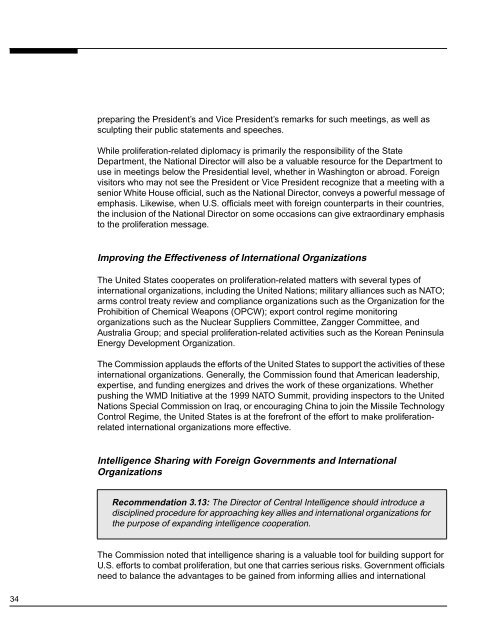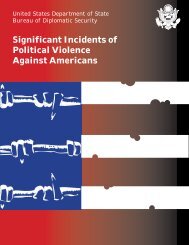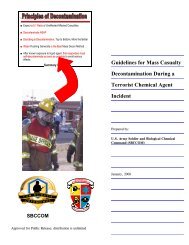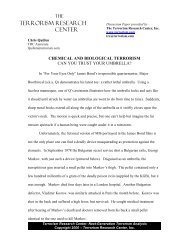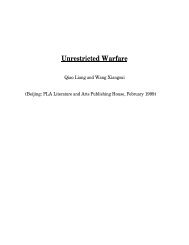- Page 1: CombatingProliferation ofWeapons of
- Page 7 and 8: ContentsExecutive Summary vIntroduc
- Page 9: Executive SummaryEvery American sho
- Page 12 and 13: Similarly, the Commission assessed
- Page 14 and 15: ole as a supplier of ballistic miss
- Page 16 and 17: economic, political, and diplomatic
- Page 18 and 19: Sixth, we must prepare for the thre
- Page 20 and 21: 82A (45p x 55p)
- Page 22 and 23: An improved mechanism for White Hou
- Page 24 and 25: esolved before the meetings occur.
- Page 26 and 27: In advising the President and ViceP
- Page 28: Recommendation 2.3: The President s
- Page 31 and 32: Chapter 3Managing the Interagency P
- Page 33 and 34: the CPC will need to set program re
- Page 35 and 36: Agency Budget ProcessesRecommendati
- Page 37 and 38: The Persian Gulf War gave vivid war
- Page 39 and 40: One example of poor coordination is
- Page 41 and 42: The lengthy time required for techn
- Page 43 and 44: • facilitating other countries’
- Page 45: efficiently among the departments,
- Page 50 and 51: The Proper Role of Export Controls
- Page 52 and 53: Second, many of the countries that
- Page 54 and 55: function is shared as a statutory r
- Page 56 and 57: coherent and effective non-prolifer
- Page 58 and 59: and training opportunities that wil
- Page 60 and 61: The Commission believes this reorga
- Page 62 and 63: Responding to Proliferation that Ha
- Page 64 and 65: Recommendation 5.4: The National Di
- Page 66 and 67: 545B (45p x 28p)
- Page 68 and 69: • Second, DoD elements are still
- Page 71 and 72: (3) Maintain the regional responsib
- Page 73 and 74: 5C (45p x 33p)61
- Page 75 and 76: and related areas (such as instrume
- Page 77 and 78: Recommendation 5.10: DOE’s prolif
- Page 79 and 80: While there has been considerable p
- Page 81 and 82: Recommendation 5.13: The President
- Page 83 and 84: Recommendation 5.16: The Director o
- Page 85 and 86: own export control system. This eff
- Page 87 and 88: For a variety of reasons, however,
- Page 89 and 90: In theory, all goods leaving or ent
- Page 91 and 92: Committee on Foreign Investment in
- Page 93 and 94: context. The results of this assess
- Page 95 and 96: when grand jury secrecy no longer a
- Page 97 and 98:
The FBI’s National Security Divis
- Page 99 and 100:
Commission notes that the FBI has i
- Page 101 and 102:
Departments of Health and Human Ser
- Page 103 and 104:
Department of AgricultureThe Depart
- Page 105:
As discussed in Chapter 3, collabor
- Page 108 and 109:
SEC. 711. ESTABLISHMENT OF COMMISSI
- Page 110 and 111:
(C) existing arrangements governing
- Page 112 and 113:
serve without compensation in addit
- Page 114 and 115:
(a) Extension of Deadline for Submi
- Page 116 and 117:
on the Senate Budget and Commerce,
- Page 118 and 119:
106
- Page 120 and 121:
Richard K. BettsCouncil on Foreign
- Page 122 and 123:
William CohenSecretary of DefenseCo
- Page 124 and 125:
EWilliam EckertDepartment of StateR
- Page 126 and 127:
Thomas GrahamSecond Choice Foundati
- Page 128 and 129:
Robert JosephDirector for Counterpr
- Page 130 and 131:
Jacob L. LewDirectorOffice of Manag
- Page 132 and 133:
Michael MoodiePresidentChemical and
- Page 134 and 135:
Paul RobinsonPresident and Laborato
- Page 136 and 137:
Owen J. SheaksSpecial AdvisorVerifi
- Page 138 and 139:
Bonni G. TischlerAssistant Commissi
- Page 140 and 141:
Gillian WoollettAssociate VP for Bi
- Page 142 and 143:
7. List and describe the authoritie
- Page 144 and 145:
17. What deficiencies and strengths
- Page 146 and 147:
Subgroup on Nuclear Export Coordina
- Page 148 and 149:
Groups Addressing WMD Accident, Eme
- Page 150 and 151:
IAEA Steering CommitteeChair: State
- Page 152 and 153:
Title (Legislation that Contains Re
- Page 154 and 155:
Title (Legislation that Contains Re
- Page 156 and 157:
Title (Legislation that Contains Re
- Page 159 and 160:
Appendix G: Resource Allocation—B
- Page 161 and 162:
Department of State• NDF• NIS e
- Page 163 and 164:
Department of Agriculture• Select
- Page 165 and 166:
AbbreviationsAGARSCBRNCDCCFIUSCPDCT
- Page 167 and 168:
Appendix H: Technology AcquisitionA
- Page 169 and 170:
to change; up-to-date data should b
- Page 171 and 172:
this activity: the Materials Protec
- Page 173 and 174:
National Goal: Military Action (Inc
- Page 175 and 176:
• PE 602715BR: Hard Target Defeat
- Page 177 and 178:
• Active defensesTechnology Progr
- Page 179 and 180:
that provides an order-of-magnitude
- Page 181 and 182:
Additional ViewsAdditional Views of
- Page 183 and 184:
The following is a brief outline of
- Page 185 and 186:
Additional Views of Margo D. B. Car
- Page 187 and 188:
Annex:Organizational OverviewsExecu
- Page 189 and 190:
policies through a briefing schedul
- Page 191 and 192:
The current Senior Director, as wit
- Page 193 and 194:
Although responsibility for prolife
- Page 195 and 196:
• the Under Secretary of Defense
- Page 197 and 198:
Treaty negotiations, U.S. nuclear p
- Page 199 and 200:
• integrated national policies fo
- Page 201 and 202:
President with the Prime Minister o
- Page 203 and 204:
A small secretariat guides the day-
- Page 205 and 206:
U.S.-Russia Proliferation Issues in
- Page 207 and 208:
and procedures; assessing competing
- Page 209 and 210:
Senate, and who is also dual-hatted
- Page 211 and 212:
Department of StateThe Non-prolifer
- Page 213 and 214:
(CTBT). The Verification and Compli
- Page 215 and 216:
The Science Centers are established
- Page 217 and 218:
Enhancing Export Controls 3Demilita
- Page 219 and 220:
KazakhstanRussiaStrategic Offensive
- Page 221 and 222:
UkraineThis assistance is to preven
- Page 223 and 224:
esource management, and to improve
- Page 225 and 226:
This expansion will cover the secur
- Page 227 and 228:
esearch and development in areas su
- Page 229 and 230:
warfighting plans are developed in
- Page 231 and 232:
The office of the Assistant Secreta
- Page 233 and 234:
Directive 5134.9, and is responsibl
- Page 235 and 236:
• The Counter-proliferation Progr
- Page 237 and 238:
4 Mitigate the Effects of WMD Use5
- Page 239 and 240:
U.S. Army Top Ranked Specific Milit
- Page 241 and 242:
• The Director, Defense Research
- Page 243 and 244:
Technology—has primary oversight
- Page 245 and 246:
• Recommendation 1 to reinforce t
- Page 247 and 248:
AEC’s successor agencies, the Dep
- Page 249 and 250:
Components of NN-40 include the Int
- Page 251 and 252:
ensure excess fissile material no l
- Page 253 and 254:
X07, 18x24• participate with the
- Page 255 and 256:
Nuclear Regulatory CommissionBackgr
- Page 257 and 258:
Office of International Programs. T
- Page 259 and 260:
The Intelligence CommunityThe Intel
- Page 261 and 262:
The DCI Nonproliferation Center, un
- Page 263 and 264:
Findings of the Aspin-Brown and Jer
- Page 265 and 266:
Department of CommerceThe Bureau of
- Page 267 and 268:
Office of Exporter Services. In add
- Page 269 and 270:
The OC weighs the intelligence info
- Page 271 and 272:
important weapon in BXA’s arsenal
- Page 273 and 274:
Non-proliferation and Export Contro
- Page 275 and 276:
The Customs Service’s response to
- Page 277 and 278:
An additional benefit to the Bureau
- Page 279:
The Exon-Florio provision does not


